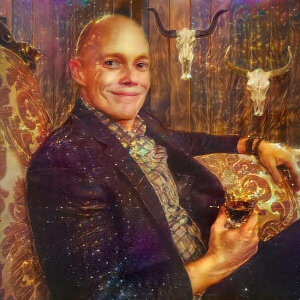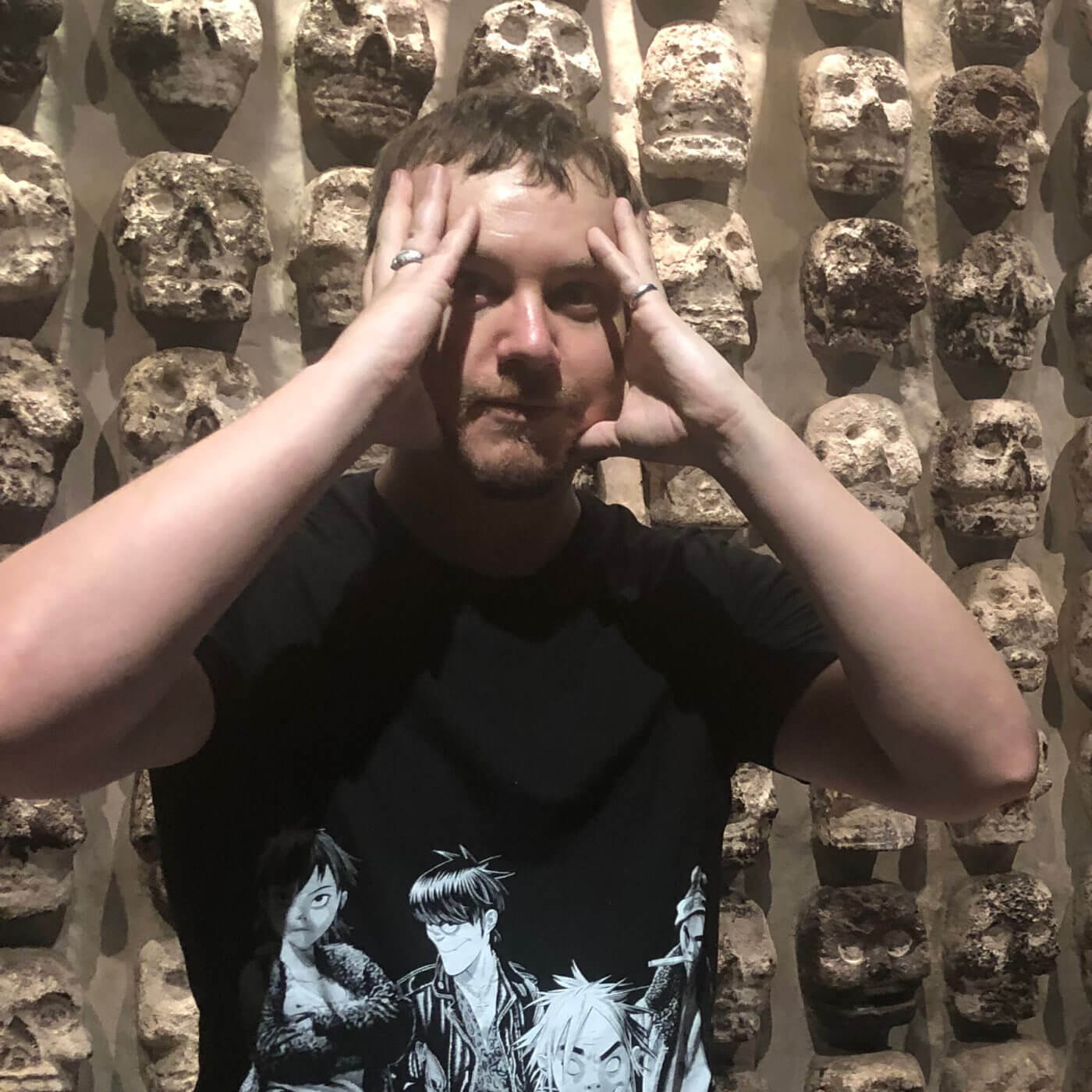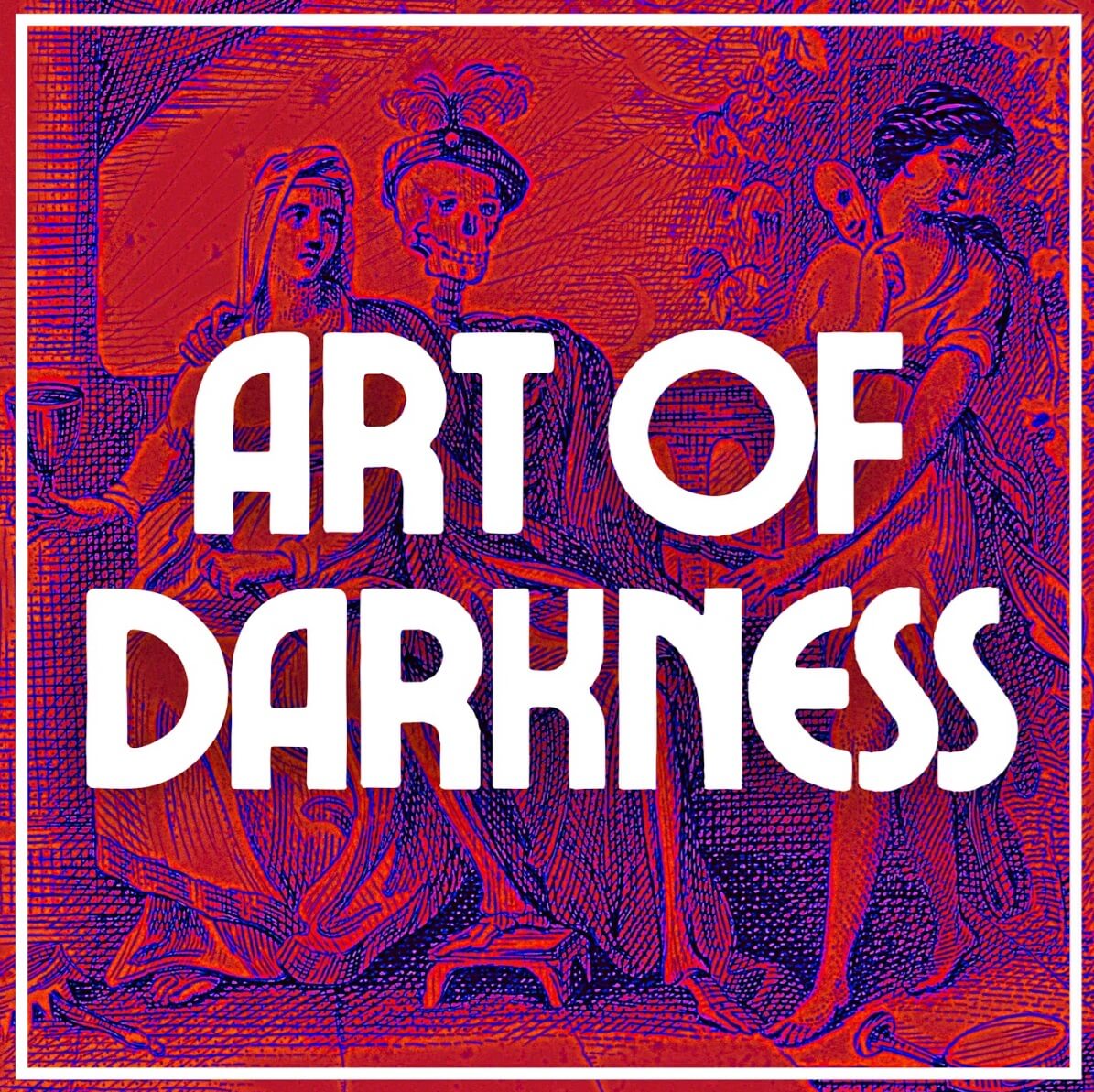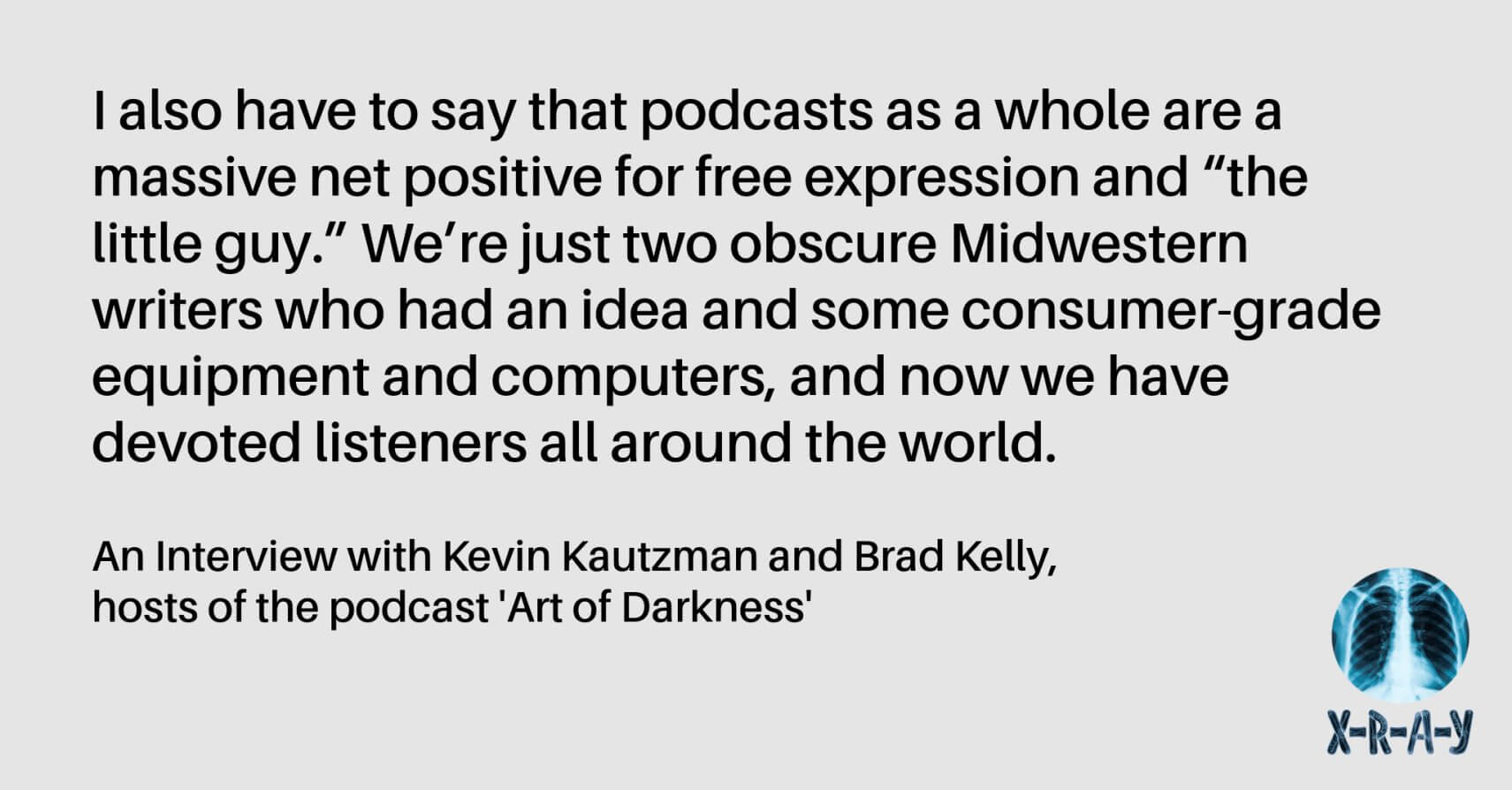Welcome to Transmissions, an interview feature in which X-R-A-Y profiles podcasts.
Brad Kelly is a writer from Detroit, Michigan. In addition to AoD, he has recently published HOUSE OF SLEEP, a work of literary psy-fi, and is currently developing a novel to be released in 2024 and an experimental text investigating the Tarot card-by-card. He is a former Michener Fellow and has been widely published in literary magazines.

Kevin Kautzman is a playwright living in St. Paul, Minnesota. His award-winning plays have appeared around the UK and US and are available in print at Broadway Play Publishing. His dark social media comedy MODERATION was adapted for an online release and can be found at moderationplay.com. A past fellow of the Michener Center for Writers and the Playwrights’ Center, he is a co-founder of Bad Mouth Theatre Company.

Art of Darkness can be found here, on Patreon, and on Substack.

Rebecca Gransden: How would you describe the podcast to someone who is unfamiliar with what you do?
Brad Kelly: Art of Darkness is a podcast about the dark side of creativity, hosted by a couple of very online writers and featuring biographical profiles of dead artists. My co-host Kevin and I cover filmmakers, theater-makers, painters, musicians, architects, writers—anybody creative, influential, and dead for longer than a year and a day is our purview.
In our Core Episodes, we go through a person’s life, work, and cultural context, taking as much time as we need to tell an artist’s story. Some episodes run over five hours, and we each take turns leading one another through an artist’s life. These thoroughly researched profiles, presented in a conversational way, are the heart of the show.
We also host guests to talk further about one of the subjects we’ve covered in Dark Room Episodes, and we run a Zoom book club for our Patreon supporters called Bookends. Additionally, we record an “After Dark” bonus episode for Patreon, for every episode we do. These typically go for 20-30 minutes.
If you’re interested in the arts, biography, and history, Art of Darkness might be your show.
RG: Does the podcast have a mission or manifesto?
BK: Our goal with every Core Episode is to create the go-to piece of online media about our subjects.
Kevin Kautzman: One major meta-thread of the show is an interrogation of what drives creativity, and we hope to inspire living artists and creatives by reflecting on the great artists of the past, warts and all. There are a lot of warts.
RG: How long has the podcast been in existence, and how have you seen it grow over that time?
BK: We released our first episode in February 2021. The show has grown fairly rapidly since then and regularly appears in the Apple Podcasts charts around the world in the Books category. We knew we had something when people started asking to come on the show, which is why we host the Dark Room interview and discussion episodes.
KK: Over the past few years, we’ve brought quite a few guests on to help us with our Core Episodes, but we’ve moved away from that as the Core Episodes have gotten longer. Guests can’t always commit four to six hours to a recording, and it’s a lot to ask of someone. So we have the Dark Room for guests who want to come on and discuss Aleister Crowley’s obscene poetry or all things Virginia Woolf.
RG: Where did the idea for the podcast come from?
BK: We conceived of Art of Darkness during the pandemic. We’d had other podcasts, together and apart, but we’d never quite found our “thing.” Kevin had an interview show called Get This, on which guests would share their enthusiasm about something—a movie, a writer, whatever. In hindsight, that show is not dissimilar from what we do with our Dark Room episodes.
After I came on as a guest on one of these episodes—talking about Philip K. Dick or Harold Bloom—the wheels started turning and a few weeks later we had Art of Darkness, and I started to prepare my first episode, on Burroughs.
KK: Brad is going to revisit Burroughs early in 2024, since that first episode is woefully short relative to our format now. If you go back and listen to the show from the beginning, you can see how the concept evolved and grew into what it is today.
RG: How did you decide upon a title for the podcast?
BK: We think people are desperate for earnestness and authenticity, especially online, and we believe there’s an audience for stories that perhaps tell us the most about what creativity actually is. This requires a complete picture of an artist’s life, including the darkness: abuse, drugs, mental illness, violence, war, betrayal, outright murder, sexual angst—the good stuff, in other words.
KK: Sturm und Drang. We knew we wanted to explore that angle, thinking maybe we could answer the question “why do artists tend to be so screwed up?” The tortured artist is a cliché for a reason.
It’s worth noting too that we don’t wallow in the “dark side,” or suggest living artists cultivate or surrender to theirs, but we give the darkness its fair due when it inevitably arises, and that sets our show apart and provides us with our driving theme.
BK: After we had the show concept, we played around with title ideas. We’re both fans of Heart of Darkness, and we opened Season III (2023) with a Core Episode on Joseph Conrad.
Just before landing on Art of Darkness, Kevin pitched the name “Heart of Artness,” which we laugh about because it’s so terrible. We have the receipts in WhatsApp.
KK: Never go with your first idea. You gotta spitball.
RG: Are there any podcasts that influenced or encouraged you to start the project?
KK: It’s fair to say the show is influenced by Hardcore History and The Last Podcast on the Left, tho we’re tonally quite different from each of these. We’re both Rogan listeners from way back and dabbled with the idea of podcasting as early as 2011. It only took us a decade to figure it out and make something people seem to want more of.
I’m also a big, three decade fan of Mystery Science Theatre 3000, which probably won’t surprise listeners. I’m almost always looking for the laugh as we record, because it’s fun and it leavens things. Each of these stories ends the same way: the subject dies, sometimes young, sometimes at their own hand. It gets heavy. On Art of Darkness, we laugh so we don’t cry.
I think too we’ve been influenced by various biopics, not least Mishima: a Life in Four Chapters and even something like Walk the Line. Our show is a show, and we try to weave a narrative that’s entertaining and informative or at least not inaccurate.
We also have to credit the many biographers whose work we lean on for the core episodes. Without their labor, we would not have a show, and we always note our sources on a given episode. We buy a lot of books.
These days too, as the show has matured, we’re more influenced by the idea of “evergreen content” generally, and I know we’re both motivated by the growing catalog and feedback we get from listeners, who binge the show and take away motivation for their own creativity or just enjoy learning about all these great figures we cover. At this moment, we’ve covered 61 core subjects. Our dream is to continue doing this show as long as we can and to have 300 or more core subjects and a massive, high-quality trove of content as a free resource for our contemporaries and posterity. It’s a hell of a project.
RG: What episode of the podcast would you recommend to someone who is new to what you do?
BK: We take turns leading our core episodes. Kevin prepares to talk about a subject and presents it to me and then I take a turn. Here’s an episode on Edgar Allan Poe, which I led.
KK: And here’s an episode I led, on Dante.
RG: How do you go about selecting what to feature on each episode?
BK: For Season IV, starting in January 2024, we had a retreat at my property in northern Michigan and hashed it out around the campfire. More directly, we come up with a list of subjects largely based on our own instincts about what will make a good subject.
We try to cover the artists we love, the artists we think our audience wants to know more about, and sometimes we cover a subject—say Aleister Crowley or John Milton—because we think they are essential to understanding cultural history—they tie many currents together.
KK: We’ve yet to argue even once about who would cover a given subject, or “called dibs” or whatever. It all just kind of comes together.
RG: If your podcast features guests, how do you go about finding them?
BK: Our Dark Room episodes are a shorter format, about an hour, in which we take a closer look at some aspect of a subject we’ve already covered. For a Dark Room episode on Franz Kafka, we hosted Ross Benjamin, the translator of a new English edition of Kafka’s Diaries.
We find our guests by being very online, and we frequently reach out to people we want to talk to. Dark Room episodes are a fairly low commitment: ninety minutes between the main episode and the After Dark we do for Patreon, all done via Zoom.
RG: If you are a writer, has the podcast impacted your writing life? and conversely, has a writerly disposition influenced the podcast?
BK: Kevin is a playwright and I’m a fiction writer. Speaking for myself, I learn a lot about the process from studying a writer like, say, Edgar Allan Poe or Emily Dickinson. You learn that they’re human beings, even if tremendously talented. That they struggled. That they were unsure of themselves and imperfect, haunted sometimes. That their triumphs were simultaneous with tragedy. And you see how their talent develops. How they make use of their lives. Also, of course, as the podcast has grown, new opportunities have presented themselves.
KK: Doing this podcast, I learned quickly from subjects like Kubrick and Woolf and Cash that you cannot and must not wait around for permission to make your art, or for some ex machina blessed anointing to fall upon your career. You really have to go and get it, make it happen, just do the thing you imagine, and try not to kill anybody or yourself or alienate too many people.
Kubrick wrestled money together from a local dentist and neighbors and family, went to California with a small production crew, and nearly killed his actors with insecticide while making his first feature, Fear and Desire, which then helped propel him into a “real” career. If he’d sat around in New York griping about what a racket Hollywood is, he would have not been wrong and we wouldn’t have Barry Lyndon and the rest of his oeuvre. Impossible to imagine but plausible.
Artists do the thing.
The show directly inspired me to start our theater company here in St. Paul, called Bad Mouth. Through that, we now do an interview podcast and radio show for the Twin Cities arts’ scene, through which we’ve released a number of play readings online.
As for Brad and my writerly dispositions affecting the show, I’d say it’s all over what we do. As writers, we’re both obsessed with narrative form and are earnestly interested in all our subjects. There’s a mysterious Venn diagram of interests, aesthetics, humor, sense of history, educational backgrounds, and approach between us that just seems to work.
And the fact we both have our own artistic practices and projects prevents us from being passive observers of our subjects. We’re really invested in understanding what drives creative genius, and how it might be harnessed or cultivated.
RG: Do you listen to podcasts?
KK: Before Art of Darkness, I listened to far more hours of podcasts than I do today. Now, between regular working life, running a theater company, writing my own plays and screenplays, raising a family, and Art of Darkness, I don’t have as much downtime, and when I have it, I usually throw on music or a film.
When I do listen to podcasts, it’s often after a search for one of our subjects, to saturate myself further in their life and see what media already exists about them, or I’ll listen to a show one of our guests is on or does. We have our own little heterodox podcast network through the show, which is a fun consequence of making Art of Darkness. I’m the resident extrovert, so I love it.
RG: What is the best podcast out there at the moment, the one you are excited for when each new episode drops?
KK: We like Weird Studies and were happy to have Phil Ford on to talk about MF DOOM in an episode.
We’re also fans of author Aaron Gwyn, who is a frequent guest on our show and who has a notable Substack where he covers Blood Meridian in exhaustive and illuminating detail. Aaron is joining us for our book club this December to talk about that great novel, in light of McCarthy’s passing.
RG: What do you dislike about podcasts?
KK: We sometimes joke about “vibecasts,” which is our little term for shows that don’t really have a driving concept and consist of vain chit chat, gossip, and maybe some cul-de-sac politics. Who has time for these, and how many such shows can the Internet sustain? You can feel the series of tubes sag under the flab of all this chatter and pseudo-political kayfabe.
Art of Darkness is vehemently not a vibecast. I also really dislike overproduced podcasts of the NPR style, where everything is squished together and there’s not a second of downtime, or any sustained authenticity. The beauty of the podcast format is that it doesn’t need to be heavily edited. It can be rough, and an antidote to overproduced, agenda-driven corporate media.
There’s an audience for the real, raw thing. There’s an audience that wants to listen to six unedited hours about the life of Aleister Crowley, with all the umms and uhhs and occasional mispronunciations. That isn’t to say your audio quality should be garbage if you can help it. But you don’t need to labor over editing to stitch a “tight” Frankenstein episode in order to satisfy an audience, with perfect diction and all the verbal fumbles smoothed out.
I also get annoyed at how astroturfed social media and the Internet writ large seem to be—a capricious nerd’s Hellraiser box that makes very little sense in terms of who the algorithm picks up and signal boosts and who stays in the digital dark. Little things, like Twitter/X deboosting threads with links, can be pretty aggravating, as can mysterious plateaus of reach on social media, never mind outright censorship. Those platforms are certainly not “organic,” and if they’re the “town square” the town square is a carnivalesque hall of mirrors.
There is far more hands-on moderation happening on these platforms than I think most people imagine, as well as obvious pay-to-play, which we don’t do (in terms of advertising, paying for clicks, whatever). All that said, we’re thrilled with the audience we have and we’re sure it will grow over time as we press on and release more episodes.
I also have to say that podcasts as a whole are a massive net positive for free expression and “the little guy.” We’re just two obscure Midwestern writers who had an idea and some consumer-grade equipment and computers, and now we have devoted listeners all around the world. We’ve made real friends and authentic connections through the show, both with guests and our audience. It’s genuinely pretty cool and would have been unthinkable twenty-five years ago. I suppose maybe we could have done this as a cable access show in the 90s, but it’s hard to imagine how that would look and sound. Party on, Brad.
RG: Is there a podcast that doesn’t exist, but you wish did?
KK: I wish David Lynch had a podcast, but I’m also glad he doesn’t. He needs to be making films and another season of Twin Peaks. Please, Lord, give us another season of Twin Peaks.
RG: For techheads, which single item of kit do you consider essential for the production of the podcast, and what would you say are the basics needed for those new to podcasting?
BK: A real microphone, not just whatever is on your computer. We use Blue Yetis, and there are a lot of good, reasonably-priced USB mics. You need a good internet connection, and you need audio editing software like Audacity.
KK: I do the audio engineering for Art of Darkness. A proper mic is essential. Our formula is:
1. Blue Yeti microphones with boom arms and pop screens.
2. Ethernet connections, not WiFi.
3. Zoom, which has an outstanding noise gate. We each record, so there’s a backup if there’s an issue.
4. Audacity for post-production, with some special sauce.
5. WordPress for hosting and distribution via RSS.
6. A Mac Studio, which is optional really. You can do all this on a decent laptop, tho it’ll take you a bit longer to do the work in Audacity.
7. Brad edits the punched-up audio into the video file and posts to YouTube.
I typically post an episode within 20 minutes of recording. You really don’t need much to produce a professional-sounding podcast, which is part of the charm.
I will say too: if you’re going on a podcast as a guest, do the bare minimum and get a Blue Yeti with a boom arm and a pop screen, and find a way to connect your computer directly to Ethernet. It’ll cost you maybe $150 and more or less last forever. The hosts and audience will thank you.
RG: If someone would like to support independent podcasts, what are the best ways to do this?
BK: The podcasts will usually tell you. For us, it’s our Patreon. Subscribers not only materially support the show, but they get a bunch of extras for the money, including the bonus “After Dark” episodes and book club access.
Maybe the most important thing you can do to support an independent podcast you like is to simply tell people about it and share links. Don’t be shy. If you love an indie podcast, share it with the people in your life who you think might appreciate it. That’s how media spreads and gets more support. It costs nothing to share a show and consciously signal-boost truly independent media.
RG: Looking back on the podcast, are there favorite episodes, episodes that stand out to you, or episodes that didn’t go as you would’ve liked?
KK: The Kubrick episode was something of a breakthrough for us, when we realized we could stretch toward upwards of three hours and still not exhaust a biography, and our audience would come with us.
As for episodes that had issues, I’d moved some cables around and mistakenly recorded into my webcam microphone when we did our Disney episode, which was extremely aggravating to discover after the fact. I punched up the audio as best I could, and it’s listenable, but that haunts me. Always triple check your settings before you record.
RG: What are your plans for the future?
BK: We’ll continue to release roughly two Core Episodes and two or three Dark Room episodes each month for the foreseeable future, and run our book club for Patreon.
We also have a second live show in development, which will take place in Detroit sometime in the back half of 2024. We hope to do more live shows and more exclusive content for Patreon as that audience grows.
KK: If the show grows enough to support it, I’d love to do a proper tour and really figure out our live show format. We’ll keep grinding and see how it goes.
Art of Darkness could theoretically go on forever, because artists keep dying like everybody else. We’ve said on the air that if one of us dies unexpectedly, the other needs to find a new co-host and go on, after a respectful hiatus of a few months. And wait a full year and a day to do the episode about the unexpectedly dead co-host.
BK: That’s the rule.
Art of Darkness can be found here, on Patreon, and on Substack.

